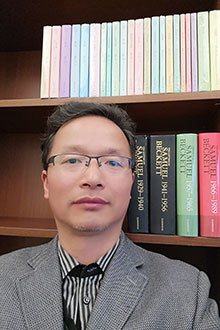
Bo Cao, an English professor at Hunan Normal University in China, will be in residence at Emory this year as he translates influential Irish writer Samuel Beckett’s letters for Chinese readers.
Bo Cao, professor of English Language and Literature at College of Foreign Studies, Hunan Normal University, Hunan Province, China, will be in residence at Emory for 2019. He is the Chinese translator of the first volume of “The Letters of Samuel Beckett” to be published by Hunan Literature and Art Press.
Cao is working with Lois More Overbeck, one of the editors of the original edition of “The Letters of Samuel Beckett,” published in four volumes by Cambridge University Press (2009-2016). The Beckett Letters Project is based in the English Department of Emory University. “The Letters of Samuel Beckett” has been translated into German (Suhrkamp Verlag), French (Editions Gallimard), and Italian (Adelphi Edizioni).
“It is a special pleasure that the edition will soon be available to readers in China, thanks to the efforts of Dr. Cao and his colleagues,” Overbeck says.
While at Emory, Cao will complete his translation of “The Letters of Samuel Beckett: 1929-1940.” He will also familiarize himself with the research for all four volumes of Beckett’s letters, so that he can guide colleagues who are translating the other three volumes. The full Chinese edition of the letters will be available by 2021.
“The publication of The Letters in Chinese will be monumental, marking the completion of the Beckett translation project and rewriting the reception of Beckett in China,” Cao says, noting that the letters, a biography with “no commentary,” are as significant as Beckett’s works themselves.
In 2016 Hunan Literature and Art Press published “The Complete Collection of Samuel Beckett” in Chinese. In that series are Cao’s translations of Beckett’s novels “Murphy,” “Watt” (first edition in 2012), and “More Pricks Than Kicks” (2016), as well as his collection of occasional pieces edited by Beckett scholar Ruby Cohn: “Disjecta” (2016).
According to Cao, critical Chinese playwrights and novelists are curious about Beckett’s avant-garde works. As to the difficulties of translation, he notes that Beckett frequently alludes to classical European philosophy and arts, which are not widely known by Chinese readers. Beckett uses many invented terms and plays many word games for which it is difficult to find exact equivalents in Chinese, making the translation of “The Letters of Samuel Beckett” challenging.
While at Emory, Cao also intends to further his studies of Irish literature and learn more about the teaching of Irish studies in the United States. He is in consultation with Geraldine Higgins, director of the Irish Studies Program at Emory, and the Massee-Martin/NEH Distinguished Teaching Chair in English (2014-2018).
“Ireland has been called the world’s smallest cultural superpower,” Higgins says. “We are delighted to have Dr. Cao here at Emory for an important cultural exchange of ideas and experiences in teaching Irish studies to an international audience.”
At issue in translation are both linguistic and cultural interpretation, and as such, the questions raised with each interpretive decision are of great interest in many fields. During his stay at Emory, Cao looks forward to meeting others who are working on these matters, as well as discussing the importance of iconic western works in modern China.
Cao is director of the Center for British and Irish Literature at the College of Foreign Studies, Hunan Normal University, where he also directs the Department of Translation Studies. Since earning his PhD in 2005 at Shanghai International Studies University, he has written on Irish and British authors and English-Chinese translation.
Among his monographs are “A Study of Samuel Beckett’s Novels of Failure” (Beijing: Commercial Press, 2015) and “Humanity Exploration: A Study of 18th Century British Novels” (Beijing: Guangming Daily Press, 2009). Among his translations is also the Irish national epic “The Tain” (Changsha: Hunan Education Press, 2008). He is secretary general of China British Literature Association.
